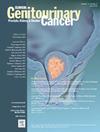Impact of Baseline Renal Insufficiency on Piflufolastat F-18 Performance and Investigation of Changes in Renal Function Following Piflufolastat F-18 Administration: Results From the OSPREY Trial
IF 2.3
3区 医学
Q3 ONCOLOGY
引用次数: 0
Abstract
Introduction
Piflufolastat F-18, a prostate-specific membrane antigen (PSMA)-targeted radiopharmaceutical, is predominantly eliminated via urinary excretion, and the kidneys have one of the highest absorbed doses. Therefore, this subgroup analysis aimed to investigate the impact of piflufolastat F-18 on renal function and its diagnostic performance in patients stratified by baseline renal function.
Patients and Methods
The OSPREY clinical trial enrolled 2 cohorts: A—high-risk patients undergoing radical prostatectomy with pelvic lymphadenectomy, and B—patients with suspected recurrent/metastatic prostate cancer on conventional imaging. Baseline estimated glomerular filtration rates were calculated, and patients were stratified by baseline chronic kidney disease (CKD) stage. Changes in serum creatinine within 28 days postdose and diagnostic performance of piflufolastat F-18 were assessed for each CKD stage group in both cohorts.
Results
385 patients (cohort A, n = 268; cohort B, n = 117) underwent piflufolastat F-18-PET/CT. Baseline and postpiflufolastat F-18 median creatinine levels (mg/dL) were similar for patients in cohort A (0.95 [n = 264] vs. 0.95 [n = 252], respectively) and cohort B (0.93 [n = 116] vs. 0.96 [n = 84], respectively). Among 332 men (cohort A, n = 249; cohort B, n = 83) with baseline and postpiflufolastat creatinine measurements, there were minimal changes in creatinine across all baseline CKD stage groups (median change ranged from -0.02 to 0.023 in groups with >1 patient). The diagnostic performance of piflufolastat F-18 showed no meaningful differences when stratified by baseline CKD stage.
Conclusion
Piflufolastat F-18 appears to be safe and effective for imaging prostate cancer, including men with mild/moderate renal insufficiency.
基线肾功能不全对匹氟司特 F-18 性能的影响以及匹氟司特 F-18 用药后肾功能变化的调查:OSPREY试验的结果。
简介前列腺特异性膜抗原(PSMA)靶向放射性药物匹氟司他 F-18 主要通过尿液排泄,而肾脏是吸收剂量最高的器官之一。因此,本亚组分析旨在研究吡氟司特 F-18 对肾功能的影响,以及根据基线肾功能分层的患者的诊断性能:OSPREY临床试验招募了两组患者:A组:接受根治性前列腺切除术和盆腔淋巴结切除术的高危患者;B组:常规影像学检查怀疑为复发/转移性前列腺癌的患者。计算基线估计肾小球滤过率,并根据基线慢性肾病(CKD)分期对患者进行分层。评估了两个队列中每个慢性肾脏病分期组在用药后28天内血清肌酐的变化以及匹氟司特 F-18 的诊断性能:385名患者(A组,268人;B组,117人)接受了匹氟拉司特F-18-PET/CT检查。队列 A(分别为 0.95 [n = 264] vs. 0.95 [n = 252])和队列 B(分别为 0.93 [n = 116] vs. 0.96 [n = 84])患者的基线和氟司特 F-18 中位肌酐水平(mg/dL)相似。在332名男性患者(A组,n = 249;B组,n = 83)的基线血肌酐测量值和氟唑司特治疗后的测量值中,所有基线CKD分期组的血肌酐变化都很小(在大于1名患者的组别中,中位变化范围从-0.02到0.023不等)。根据基线 CKD 分期进行分层后,匹氟司特 F-18 的诊断性能没有明显差异:结论:氟唑司他 F-18 用于前列腺癌成像似乎安全有效,包括轻度/中度肾功能不全的男性。
本文章由计算机程序翻译,如有差异,请以英文原文为准。
求助全文
约1分钟内获得全文
求助全文
来源期刊

Clinical genitourinary cancer
医学-泌尿学与肾脏学
CiteScore
5.20
自引率
6.20%
发文量
201
审稿时长
54 days
期刊介绍:
Clinical Genitourinary Cancer is a peer-reviewed journal that publishes original articles describing various aspects of clinical and translational research in genitourinary cancers. Clinical Genitourinary Cancer is devoted to articles on detection, diagnosis, prevention, and treatment of genitourinary cancers. The main emphasis is on recent scientific developments in all areas related to genitourinary malignancies. Specific areas of interest include clinical research and mechanistic approaches; drug sensitivity and resistance; gene and antisense therapy; pathology, markers, and prognostic indicators; chemoprevention strategies; multimodality therapy; and integration of various approaches.
 求助内容:
求助内容: 应助结果提醒方式:
应助结果提醒方式:


